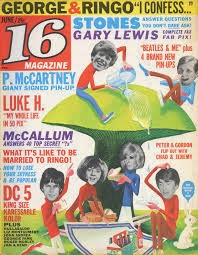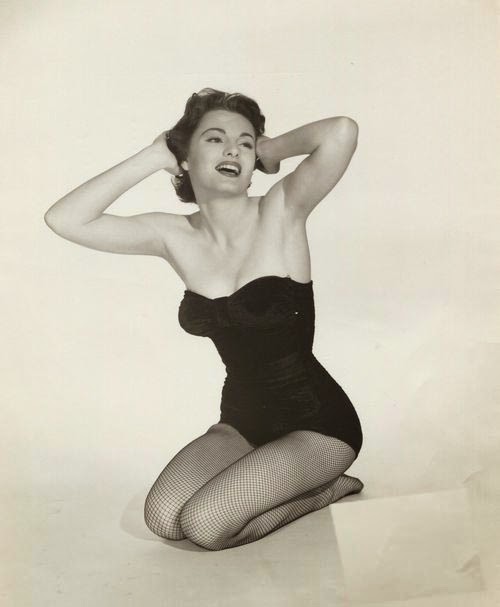 |
| U.N.C.L.E. - David McCallum? |
16 magazine. 1957-2001. A ‘fan’ publication. Written —primarily—for teenage, American girls. The editorial focus was on television and teen male music celebrities.
How did an editor who extolled the talents of David Cassidy
and Paul Revere & the Raiders ever gain such influence? Well, for a start,
she gave us answers: What does the Dave Clark Five eat for breakfast? How tall,
really, is the Monkees’ Davy Jones? What about Paul McCartney’s favorite color?
Are Sonny and Cher dating or married?
Just considering the career of Gloria Stavers (1926-1983) causes one to
hold, and balance, sets of opposed virtues, tastes and
interpretations. She is evasive, on one page jabbering about Gary Lewis and the Playboys, the next, discussing the career of Lenny Bruce or getting physical with
Jim Morrison.
 |
| Gloria glammed |
How this former magazine subscription clerk and model helmed
bubblegum pop promotion with such élan has as much to do with ambition and
self-confidence than discernible talent. It’s as if she willed herself into existence.
As editor-in-chief, she never accepted advertising. Readership peaked
at more than five million in 1964. Her talent was quite discernible.
The magazine offered clean, sober intimacy, underpinned with grade-school
photo collages and non-threatening confessions, trivializing real-world, contemporary
concerns. There was little chest hair. Gloria knew who paid the bills.
 |
| Gloria editing |
She focused on boys but occasionally let girls through the
door—Connie Francis, Hayley Mills, Patty Duke, Susan Dey, Marie Osmond, Farrah
Fawcett. But young male readers generally went elsewhere to look at pictures of pretty
women.
When she died, Dave Marsh in Rolling Stone opined… “[we have] lost America’s original pop-music
writer, the force behind what was at one time the most influential and widely circulated
rock publication in America.”
Dave Marsh wrote that?
Gloria Stavers knew, intuitively, that pop culture is
interchangeable with
commercial culture: therein lies its genius, its banality, its endurance, and its fragility.
 |
| Jim and G-L-O-R-I-A |



























